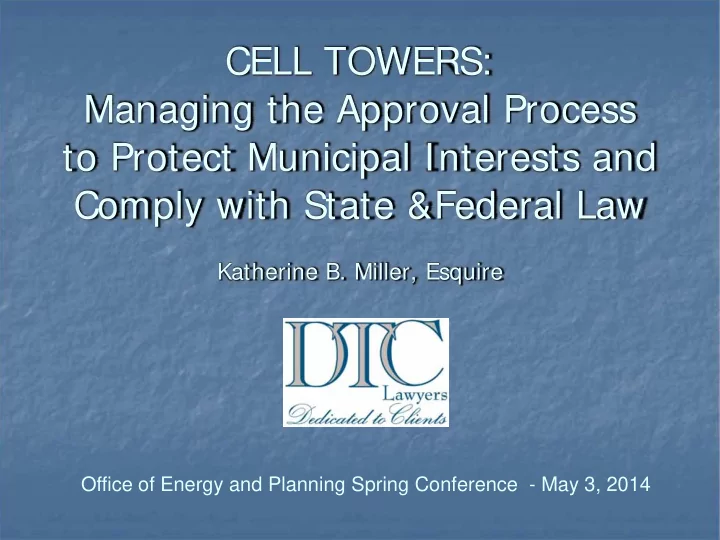

CELL TOWERS: Managing the Approval Process to Protect Municipal Interests and Comply with State &Federal Law Katherine B. Miller, Esquire Office of Energy and Planning Spring Conference - May 3, 2014
THE ONLY THING CONSTANT IS CHANGE TELECOMMUNI CATI ONS ACT OF 1996 FEDERAL COMMUNI CATI ONS COMMI SSI ON’S 2009 “SHOT CLOCK” ORDER MI DDLE CLASS TAX RELI EF AND JOB CREATI ON ACT OF 2012 “CO-LOCATI ON AS-OF-RI GHT” RSA 12-K AMENDMENTS I N 2013
WHAT YOU WILL LEARN: � Overview of Federal Law on Applications to Local Land Use Boards for Personal Wireless Communications Facilities (commonly “cell” or “wireless” towers) � FCC’s “Shot Clock” Order, Setting Deadlines for Boards to Act on Applications for Wireless Towers and Antennae � New “Co-Location –As-of– Right” for Antennae and Modifications of Wireless Tower or Base Stations � Amendments to New Hampshire Law: RSA 12-K � Practical Suggestions for Boards
PART I: TCA, FCC ORDER & RSA 12-K � TCA sets parameters for local land use decisions on wireless tower applications � TCA does not pre-empt local or state law, but 2012 federal law does on co-location applications, and new RSA 12-K pre-empts local law on co-locations. � TCA does provide an umbrella of requirements for � Substance (reasons) for decisions � Documentation in the record � Timeliness of decisions (as modified by 2009 FCC “Shot Clock” Order)
TCA REQUIREMENTS (1) Boards may not “unreasonably discriminate” among “providers of functionally equivalent services”
TCA REQUIRMENTS (con’t) (2) Decisions of Boards may not “prohibit or have the effect of prohibiting” the provisions of personal wireless services.
TCA REQUIRMENTS (con’t) (3) Boards must act “within a reasonable period” What is reasonable? � Previously, “reasonable” was defined under local law and procedures. � Now, FCC has ordered specific deadlines.
FCC “SHOT CLOCK” ORDER Decisions must be made within 90 days on applications for co-location � of a new antenna on an existing tower or facility (now changed by 2012 federal law and 2013 amendments to RSA 12-K) � 150 days on applications for construction of a new wireless tower
CO-LOCATION AS-OF-RIGHT � New federal law, effective in 2012, exempts from zoning and local land use Board review all applications for: � Co-locating new antennae on any existing wireless tower or base station, and/or � Modifications of an existing wireless tower or base station that are not “substantial � Questions: Do Building Codes Apply?
ANSWER: 2013 AMENDMENTS TO RSA 12-K Co-location applications and modification applications shall be reviewed for conformance with applicable building permit requirements but shall not otherwise be subject to zoning or land use requirements, including design or placement requirements, or public hearing review. RSA 12-K: 10, I. � Additional information required must be requested within 15 days; � Application deemed granted if no decision after 45 days.
TCA REQUIRMENTS (con’t) (4) If Board denies application, denial must be based on “substantial evidence” in a written record
TCA REQUIRMENTS (concluded) (5) Boards may not regulate wireless antennae or towers due to environmental effects of radio frequency emissions, if the antennae or towers comply with FCC regulations
REMEDIES UNDER THE TCA � If an applicant believes a Board has violated the TCA, it may bring an action in State or Federal Court. � Court may remand for further proceedings; � Grant injunctive relieve (e.g. ZBA must grant a variance), or � Deny Relief � Abutters do not have standing under the TCA to challenge decisions granting a wireless tower application, but can intervene to protect state law rights if application is denied.
REMEDIES UNDER STATE LAW � Abutters do have standing in some cases to challenge decisions under State law.
REMEDIES UNDER 2013 AMENDMENTS TO RSA 12-K � Applications for co-location and /or modifications that are not “substantial” (increase of 10% of the vertical height of the tower or mount, or 20’) are deemed granted after 45 days, if building inspector/ code enforcement officer has not acted. No need to go to court. � Administrative decisions that application is or is not exempt under RSA 12-K may be appealed to ZBA.
PART III: PRACTICAL SUGGESTIONS FOR LOCAL LAND USE BOARDS & CEO’s ON COMPLIANCE WITH TCA, THE FCC ORDER and RSA 12-K
START WITH THE APPLICATION Within 15 days (co-location) or 30 days (new wireless facility), determine: � Is the form complete? � What relief is requested? (Zoning? Planning Board?) Is it exempt? (RSA 12-K) � Is application substantively complete – or is more information needed from Applicant? (Consider use of consultants and/or experts.)
Active Management of Calendar required throughout process, to ensure compliance with 15/30/45/150-day rules You need a quarterback on your side, from start to finish. � Consider using Town Counsel, Special Counsel and/or a consultant � to assist with management of process.
New State Law Requirements on “Completeness” : � RSA 676:4,I(b) � Planning Boards may not require all permits to accept jurisdiction.
Work with Applicants on Consensual Extension of “Shot Clock” & RSA 12-K Deadlines Whenever Needed FCC has made clear that it expects Boards and Applicants to work together on this. Not so with RSA 12-K but may be necessary. The process used in wireless tower cases can become the “best practices” in your community for all applications, streamlining the process for your Boards and Applicants.
Document all extension of deadlines in writing and all requests for extensions (and why) if applicant will not extend deadlines to establish “reasonableness” of delay should Board end up in Court
PAYING FOR COSTS OF COMPLYING WITH THE NEW DEADLINES � Planning Boards have authority to charge applicants “reasonable expenses” (RSA 12-K:4; RSA 676:4,I(g)). � ZBAs have parallel authority now. (RSA 676:5; RSA 676:4-b and RSA 673:16,II).
CONCLUSION: With systematic documentation and a well thought-out process to review applications for co-location and new wireless facilities, local land use boards can serve their communities well, and comply with TCA, the FCC’s “Shot Clock” order and RSA 12-K With acknowledgments to Hill Street Blues: “Be Careful Out There!”
Recommend
More recommend